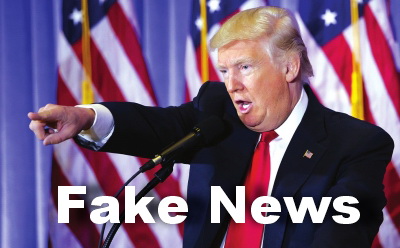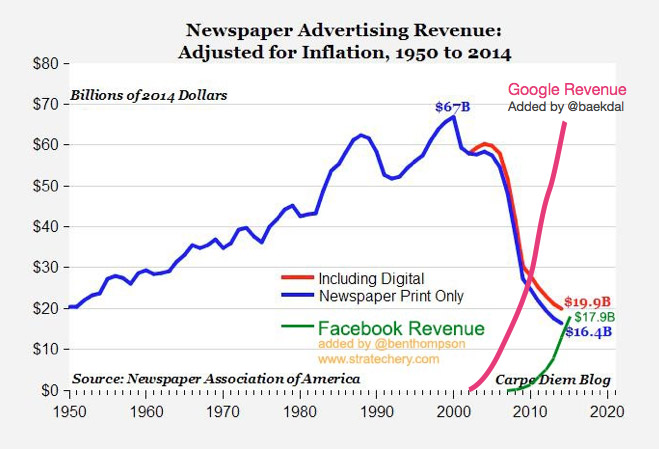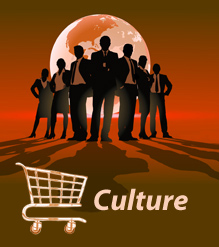



| Business-Managed Democracy » Culture » Social Media » News » Mainstream News |
The trust people have for the mainstream media has dropped with the increase in news on the internet and, in particular, social media: “More voices, in other words, means less trust in any given voice”. In 2010 Yahoo News was the largest online news site and had 85 million visitors each day. A link on Yahoo News can generate up to 12 million views on the linked website.
What is more, mainstream news sites are increasingly sourcing news from social media sites (see chart below)
 During the 2016 US election campaign, right-wing groups, Republicans and Donald Trump, started labelling any mainstream media news that opposed their agenda as ‘fake news’. Rush Limbaugh, on his right-wing radio show, said “The fake news is the everyday news… They just make it up.” Whereas previously fake news referred to stories that had been fabricated as click bait, it was broadened to include poorly researched stories, biased stories, propaganda, and then news that didn’t fit with one’s beliefs.
During the 2016 US election campaign, right-wing groups, Republicans and Donald Trump, started labelling any mainstream media news that opposed their agenda as ‘fake news’. Rush Limbaugh, on his right-wing radio show, said “The fake news is the everyday news… They just make it up.” Whereas previously fake news referred to stories that had been fabricated as click bait, it was broadened to include poorly researched stories, biased stories, propaganda, and then news that didn’t fit with one’s beliefs.
 Reference: Jeremy W. Peters. ‘Wielding Claims of ‘Fake News,’ Conservatives Take Aim at Mainstream Media.’ The New York Times. 25 December 2016.
Reference: Jeremy W. Peters. ‘Wielding Claims of ‘Fake News,’ Conservatives Take Aim at Mainstream Media.’ The New York Times. 25 December 2016.In defining “fake news” so broadly and seeking to dilute its meaning, they are capitalizing on the declining credibility of all purveyors of information, one product of the country’s increasing political polarization. And conservatives, seeing an opening to undermine the mainstream media, a longtime foe, are more than happy to dig the hole deeper.
Not only does this make it difficult for ordinary people to know what news is credible, but it enables people to dismiss news that doesn’t fit with their worldview.
 Social media news sites do not differentiate when it comes to how trustworthy a news source is. The spicier the headline the better. This is influencing mainstream media, which is competing for advertiser dollars, particularly online.
Social media news sites do not differentiate when it comes to how trustworthy a news source is. The spicier the headline the better. This is influencing mainstream media, which is competing for advertiser dollars, particularly online.
 Reference: Eli Pariser, The Filter Bubble: What the Internet Is Hiding from You. New York: Penguin, 2011.
Reference: Eli Pariser, The Filter Bubble: What the Internet Is Hiding from You. New York: Penguin, 2011.The attention economy is ripping the binding, and the pages that get read are the pages that are frequently the most topical, scandalous, and viral… The top story in 2005 for the Seattle Times stayed on the most-read list for weeks; it concerned a man who died after having sex with a horse. The Los Angeles Times’s top story in 2007 was an article about the world’s ugliest dog.
A study of the New York Times readers found: “more practically useful, surprising, affect-laden, and positively valenced articles are more likely to be among the newspaper’s most e-mailed stories on a given day, as are articles that evoke more awe, anger, and anxiety, and less sadness.”
 There is also a tendency for mainstream media to publish stories that they don’t know are true. In 2015, for example, the Daily Mail published a story that prime minister David Cameron had committed “an obscene act with a dead pig’s head” when he was a student at Oxford as part of an initiation ceremony. The journalist who had co-written the story admitted she didn’t know if it was true, and had no evidence to support it, she was just reporting what her unnamed source, a “distinguished Oxford contemporary”, had told her. She said that it was up to readers, not herself as the journalist, “to decide whether they give it any credibility or not”.
There is also a tendency for mainstream media to publish stories that they don’t know are true. In 2015, for example, the Daily Mail published a story that prime minister David Cameron had committed “an obscene act with a dead pig’s head” when he was a student at Oxford as part of an initiation ceremony. The journalist who had co-written the story admitted she didn’t know if it was true, and had no evidence to support it, she was just reporting what her unnamed source, a “distinguished Oxford contemporary”, had told her. She said that it was up to readers, not herself as the journalist, “to decide whether they give it any credibility or not”.
Katharine Viner, editor-in-chief of the Guardian, has lamented the “diminishing status of truth” and the community’s inability to reach a consensus about the truth.
 Reference: Katherine Viner, ‘How Technology Disrupted the Truth.’ The Guardian. 12 July 2016.
Reference: Katherine Viner, ‘How Technology Disrupted the Truth.’ The Guardian. 12 July 2016.Increasingly, what counts as a fact is merely a view that someone feels to be true – and technology has made it very easy for these “facts” to circulate with a speed and reach that was unimaginable in the Gutenberg era (or even a decade ago). A dubious story about Cameron and a pig appears in a tabloid one morning, and by noon, it has flown around the world on social media and turned up in trusted news sources everywhere. This may seem like a small matter, but its consequences are enormous.
There was a time when the established media decided what was true and although this was an elite version that biased the status quo and existing authorities, the current alternative means that it is far easier to publish false information that is quickly shared around the world in an “information cascade” before it can be discredited. Such false stories may be deliberate, meant to spread panic, or manipulate public opinion. Corrections or rebuttals are less likely to go viral or be read by those who are happy to believe the false story. False stories are usually so much more sensational and exciting than the truth.
Whereas it was once news editors of newspapers and television stations that decided what news was important and relevant, and much has been written about their biases and the interests they served, the new gatekeepers of news websites are often “invisible” and therefore “unaccountable”.
Whereas once the mainstream media controlled the distribution of the journalism they paid for, now it is the social media platforms that decide, using their algorithms, what news users will see, and they are able to make money out of the journalism in mainstream media.
 Reference: Katherine Viner, ‘How Technology Disrupted the Truth.’ The Guardian. 12 July 2016.
Reference: Katherine Viner, ‘How Technology Disrupted the Truth.’ The Guardian. 12 July 2016.Publications curated by editors have in many cases been replaced by a stream of information chosen by friends, contacts and family, processed by secret algorithms. The old idea of a wide-open web – where hyperlinks from site to site created a non-hierarchical and decentralised network of information – has been largely supplanted by platforms designed to maximise your time within their walls, some of which (such as Instagram and Snapchat) do not allow outward links at all.
Not only do the stories on social media news feeds all look the same, however reliable their source, but increasingly formerly credible sources are also publishing fake or distorted stories in the race for clicks. Advertisers don’t care if a news story is true, only whether it attracts viewers.
The advertising money that used to go to the mainstream media is increasingly going to the social media platforms: “in the first quarter of 2016, 85 cents of every new dollar spent in the US on online advertising went to Google and Facebook.” “Instead of taking out expensive advertisements in the New York Times, it was now possible to track that elite cosmopolitan readership using data acquired from Acxiom or BlueKai.”

This means traditional news publishers are losing revenue and journalists are losing their jobs; one third of them in the UK between 2001 and 2010, one third of them in US newsrooms between 2006 and 2013, and 20% in Australia between 2012 and 2104. Paper newspapers, such as UK’s Independent are going out of business; 181 local newspapers in the UK since 2005.
 Reference: Katherine Viner, ‘How Technology Disrupted the Truth.’ The Guardian. 12 July 2016.
Reference: Katherine Viner, ‘How Technology Disrupted the Truth.’ The Guardian. 12 July 2016.Many newsrooms are in danger of losing what matters most about journalism: the valuable, civic, pounding-the-streets, sifting-the-database, asking challenging-questions hard graft of uncovering things that someone doesn’t want you to know. Serious, public-interest journalism is demanding, and there is more of a need for it than ever. It helps keep the powerful honest; it helps people make sense of the world and their place in it.
“If news matters, newspapers matter, because their journalists write most of it. Although the majority of Americans get their news from local and national TV broadcasts, most of the actual reporting and story generation happens in newspaper newsrooms.” Even blogs generally rely on newspapers for the news sources.
© 2018 Sharon Beder
http://www.herinst.org/BusinessManagedDemocracy/culture/socialmedia/mainstream.html
